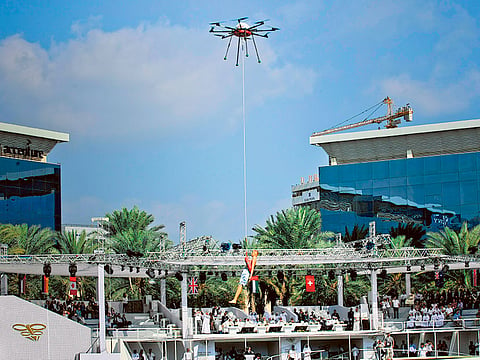Drones that can save lives, issue parking fines and inspect sites in UAE
Drones might soon replace parking inspectors in Dubai and catch errant motorists

Dubai: Drones might soon replace parking inspectors in Dubai and automatically catch motorists violating parking rules or even replace cars that deliver blood for transfusions during emergencies.
These are just a few of the scenarios demonstrated at the semi-final round of the UAE Drones For Good Award on Friday at Dubai Internet City.
His Highness Shaikh Mohammad Bin Rashid Al Maktoum, Vice-President and Prime Minister of the UAE and Ruler of Dubai, had launched the award at the Government Summit in February last year to put this innovative technology to good use.
Mohammad Abdullah Al Gergawi, UAE Minister of Cabinet Affairs, was present at the competition that saw 39 semi-finalists demonstrating their drones’ capabilities to win the judges’ approval to make it to the final round on Saturday.
Dubbed as the first World Cup of civilian drones, the 15 contestants for the national category and 19 for the international category — were given five minutes each to showcase the drones would-be contribution in the fields of humanitarian aid, civil defence, health, logistics, agriculture, environment, among others.
An octocopter or eight-rotored drone called Sanad was a crowd favourite when it dropped two lifebuoys on the man-made lake and then lifted a “drowning” man to safety. The Fully Automated Parking System drone also impressed with its capability to scan parking lots every hour for possible violators thus eliminating the need for many parking inspectors.
The Health Sector drone drew applause from the public for its dramatic portrayal of delivering a pint of blood needed to save the life of a critically-injured patient.
“We’ve been working on this since October. We used all our spare time and weekends to finish the drone on time as we didn’t want our effort to go to waste,” Mishal Al Marzouqi, who worked on the Health Sector drone, told Gulf News.
Al Marzouqi said he and his friend, Saeed Al Nazari, worked directly with the Dubai Health Authority to design the drone to carry a mobile pharmacy, blood, and supplies during emergencies.
“We want to maximise its performance so it can act as a first responder during emergencies and not just a backup. With this drone, we want to make people happier today and not tomorrow,” Al Nazari said.
Developing drone technology is still in its early stages in the UAE. Regulations on drone flights are underway so as not to disrupt flights or damage property in case of a crash.
Using drones as opposed to manned helicopters is increasingly becoming popular in many fields that require services in flight because it is estimated to cost one-tenth the actual cost to fly a helicopter to do the job.
Majid Al Suwaidi, managing director of Dubai Internet City and Dubai Outsource Zone, told Gulf News the need for drones in the UAE is there although it has yet to develop.
“The need is the same as when they invented the car. People didn’t use it then, but used alternative transport. But when the car got developed, it became in demand.
“The drones have the same potential,” he said.
Sign up for the Daily Briefing
Get the latest news and updates straight to your inbox



